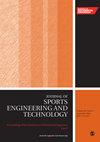A comparison of protocols for measuring forces during landing on competition mats in gymnastics
IF 1.1
4区 医学
Q4 ENGINEERING, MECHANICAL
Proceedings of the Institution of Mechanical Engineers, Part P: Journal of Sports Engineering and Technology
Pub Date : 2022-12-09
DOI:10.1177/17543371221140495
引用次数: 0
Abstract
During apparatus dismounts gymnasts land from up to 4 m above the landing surface. The gymnast needs to withstand high impact forces and the use of landing mats allows gymnasts to attenuate the forces with their landing strategy and interaction with the landing mats. Competition landings from various gymnastics apparatus involve the use of a 200 mm thick landing mat, with an additional 100 mm thick mat placed on top. The purpose of this research was to investigate the experimental protocols for measuring forces using force platforms during landings on competition mats. Three experimental protocols were compared, each of which used a force platform underneath landing mats in various set-ups. In Protocol 1 the mats were placed directly onto the force platform; in Protocol 2 the mats were placed on an enlarged raised extension; in Protocol 3 smaller mats were used with the extension. Differences between the vertical landing velocities calculated from kinematic data and from force platform data were used to assess how much impulse was transferred to the force platform in each of the protocols. Protocol 3 was the preferred method for collecting landing forces and resulted in a mean percentage velocity absolute difference of less than 2% for both one-mat and two-mat conditions. This study demonstrates the importance of keeping the landing mats clear of the force platform surroundings during the whole of the landing phase.体操运动员落地垫测力方案的比较
在器械拆卸过程中,体操运动员从最多4个落地 m。体操运动员需要承受高冲击力,而落地垫的使用使体操运动员能够通过落地策略和与落地垫的互动来减弱冲击力。各种体操器械的比赛落地需要使用200 mm厚的着陆垫,另有100 mm厚的垫子放在上面。本研究的目的是研究在比赛垫上着陆时使用力平台测量力的实验方案。比较了三种实验方案,每种方案在不同的设置中都在着陆垫下面使用了一个力平台。在协议1中,垫子直接放置在部队平台上;在方案2中,垫子被放置在扩大的凸起延伸部分上;在协议3中,较小的垫与扩展一起使用。根据运动学数据和力平台数据计算的垂直着陆速度之间的差异用于评估在每个协议中有多少脉冲传递到力平台。方案3是收集着陆力的首选方法,并导致单垫和双垫条件下的平均百分比速度绝对差小于2%。这项研究证明了在整个着陆阶段保持着陆垫远离部队平台周围环境的重要性。
本文章由计算机程序翻译,如有差异,请以英文原文为准。
求助全文
约1分钟内获得全文
求助全文
来源期刊

Proceedings of the Institution of Mechanical Engineers, Part P: Journal of Sports Engineering and Technology
ENGINEERING, MECHANICAL-SPORT SCIENCES
CiteScore
3.50
自引率
20.00%
发文量
51
审稿时长
>12 weeks
期刊介绍:
The Journal of Sports Engineering and Technology covers the development of novel sports apparel, footwear, and equipment; and the materials, instrumentation, and processes that make advances in sports possible.
 求助内容:
求助内容: 应助结果提醒方式:
应助结果提醒方式:


